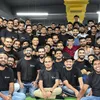[YS Learn] Product accelerator WeKan’s co-founder Sathya Nellore Sampat tells what to keep in mind while building an MVP
The minimum viable product (MVP) plays a vital role in understanding customer needs and gives investors a sense of what the product can achieve with scale. This time we spoke with product accelerator WeKan’s co-founder Sathya Nellore Sampat on the importance of an MVP.
Many founders provide detailed insights into how they built their first product, with their advice serving as standard candles for upcoming entrepreneurs. New York-based product accelerator WeKan’s co-founder Sathya Nellore Sampat talks to YourStory about the important pointers that need to be kept in mind while building a minimum viable product (MVP).
With over five years of experience as an entrepreneur and angel investor, Sathya is passionate about backing and working with spirited founders who are building disruptive solutions. Under his leadership, WeKan has accelerated about 20 companies across the traveltech, proptech, B2B, and mobility verticals.
The New York based product accelerator has announced the launch of its 'Future of Work' cohort. The idea behind this launch is primarily to back entrepreneurs who are committed to making work more collaborative, productive and fun.
The key areas WeKan is excited to back are - builder tools (low code systems), developer tools, design systems, sales tools, scaling backend operations as a service, the gig economy, and work life balance platforms.
At WeKan, Sathya served on the board of a bunch of startups, including Ridekleen (a mobility startup which was later acquired by Cox Automotive) and Uncube (a proptech platform which later got an acquisition offer from CoWrks). He is also an angel investor and has backed companies like CityMall (social ecommerce startup) and Mitron.
“At WeKan, not only do we help our entrepreneurs with product decisions, but we also give access to in-house low code/rapid application development tools to accelerate development from weeks to days and help save both time and cost,” says Sathya.

A product life cycle
Focus on core factors
The accelerator banks on the wealth of experience from backing multiple startups in the US and India, and advises founders to take certain steps to validate their ideas/features while building an MVP.
- Storyboard MVP – validate your hypothesis with just a storyboard/prototype
- Fake door MVP – indicate to potential users about a particular upcoming idea or feature. For example, add a button to upgrade to premium features on a product without building it.
- Concierge MVP – when you have a baseline product, and two or three major customers need customisations, productise them if you see a rise in demand.
Users will pay for the products they need
- While the founders can make a lot of decisions based on first principles and reasoning at the initial stage, they should move towards data-driven decision-making as the product evolves.
- It is also important to keep a check on the feature adoption ratio to ensure that you are not bloating the product.
- Listen very carefully to their customer needs. Find their biggest pain point and give them a 10x better solution. If they like your offerings, they will pay for it as well.
- Build the right process to have clear feedback loops, and clearly differentiate between the signal and the noise. Product evolution takes time, so stay patient and focused on your core problem statement.
Make mistakes but avoid the costly ones
While quite a lot of mistakes are made, some of them are costly:
- Founders’ dilemma of building a dump of features v/s building features that matter
- Building on a tech stack that doesn’t scale with your needs
- Not focusing enough on the mobile experience or from wherever the most traffic would come from
- Not being able to clearly communicate your needs to your product teams
- Spending too much time to address the scaling challenges; at the early stages, you can afford to do things that don’t scale
- Some of these mistakes can cost you everything, while for others it may take weeks/months if you need to rebuild your tech on a stack.
Not all mistakes will take all your time. Learn to prioritise which ones are severe and communicate to your early adopters. Sathya says the reason WeKan provides product development support to startups is to avoid these early and costly mistakes.
CPO needs to be customer-facing
A CPO needs to:
- Identify the different user personas including power users, understand their pain points in depth, and validate features/roadmaps continuously
- Be a community evangelist/subject matter expert
- Be the customer's voice within the company
- Define the north star metric with the founders, and make sure all the stakeholders are aligned towards that goal
- Post-launch, play the part of the customer success manager, learning from valuable customer insights
Be mindful of the core architectural decisions
WeKan CTO Ranjan Moses, who also worked with Microsoft, Symantec, and Blackberry, says,
“If you are a B2C ecommerce company, in the early stages, setting up a website based on battle-tested Shopify platform would allow you to be robust as a platform without worrying about time or fund constraints. If you are a B2B enterprise software startup, what you are selling is the software itself and this is where you need to be more mindful about your architecture decisions.”
He further advises:
- Choosing the right tech stack is very important. This helps sets the tone for what can be achieved in the short term and how it can scale for the future without needing a massive overhaul. For example, if you choose React.Js to power your web applications, it's quite easy to scale to mobile apps by extending to react-native in the future.
- Secondly, do not over-engineer the architecture. For example, you can start with a monolithic architecture as opposed to microservices. While a microservice architecture benefits when you're at scale, it also needs independent teams to manage and run each application, thereby increasing cost for the organisation.
Thirdly, adopt the right balance when it comes to the Buy vs Build strategy. To accelerate product development, look at services that can do the heavy lifting for you. For example, if you would like to build a real-time service, rather than building it out in-house which is going to take time and cost, you can adopt a plug-n-play service like a pusher.

Sathya Nellore Sampat
B2B unicorns
- Enterprise SaaS has been growing exponentially with aggregate revenues touching about $100 billion. This is just 20 percent of the entire Enterprise software market, with a lot of room to grow.
- Between 2008 and 2020, a lot of enterprises started moving to the cloud; infrastructure as a service scaled massively and set the foundation for companies to offer SaaS.
- Fast-growing startups born on the cloud – such as Slack, Freshworks, and Twilio – already have clocked hundreds of millions of dollars in revenue and they will soon surpass the other traditional companies.
Sathya says,
“The next decade is all about the growth of SaaS companies – take the example of mature companies like Microsoft and Adobe, which is scaling upwards of 25-30 percent YOY. These numbers are unheard of in mature companies. Keep in mind these companies were not born in the cloud, they moved to the cloud.”
Sathya says he believes a new set of 100 B2B SaaS unicorns are being built and WeKan will want to back them.
Edited by Kanishk Singh






![[YS Learn] Product accelerator WeKan’s co-founder Sathya Nellore Sampat tells what to keep in mind while building an MVP](https://images.yourstory.com/cs/2/a9efa9c02dd911e9adc52d913c55075e/MVP-1600234677066.png?mode=crop&crop=faces&ar=2:1?width=3840&q=75)







